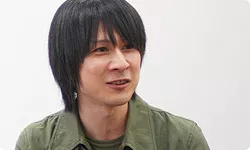Yasunori Mitsuda
aka:
Yasunori Mituda,
Y. Mitsuda,
光田 康典
Moby ID: 40526
Biography edit · view history
Yasunori Mitsuda (光田 康典) was born on January 21, 1972 in Tokuyama, Yamaguchi Prefecture, Japan, and raised in Kumake. As a child, he took piano lessons, but he was more interested in sports and so never took music seriously. He also took to computers at an early age, and he taught himself to program simple songs and games. After a brief infatuation with golf, Mitsuda rediscovered music in high school, inspired by the scores of movies such as Blade Runner and by the works or composers such as Henry Mancini.
After high school, Mitsuda moved to Tokyo and enrolled in the Junior College of Music. Despite the school’s low prestige, Mitsuda received solid instruction from his professors, most of them practicing musicians who would take Mitsuda to gigs with them to help carry and set up equipment. Despite being used for free physical labor, Mitsuda got a first-hand view of the Japanese music world and valuable training both in and out of the classroom.
One of his instructors had worked in video games, and he showed Mitsuda an advertisement for an opening in the music department at the software developer Square. Mitsuda sent a demo which won him an interview at the game studio. Despite the “disastrous” interview (as he describes it), Mitsuda was offered a position on the company’s sound team in April, 1992.
Although his official job title was “composer”, Mitsuda found himself working more as a sound engineer, a person who takes compositions by other people and adapts them to the technology used in making video games. In 1995, he finally gave Square's vice president, Hironobu Sakaguchi, an ultimatum: let him compose, or he would quit. Sakaguchi assigned the young musician to the team working on Chrono Trigger. Mitsuda was allowed to compose the majority of the tracks for the game under the watchful eye of veteran composer Nobuo Uematsu.
Mitsuda worked on four more titles for Square, the last being Xenogears in 1998. He then went freelance, though he continued to work closely with Squaresoft on projects such as the Chrono Trigger sequel, Chrono Cross. He has also released non-video-game music, such as his CD Sailing to the World.
Credited on 67 games
Displaying most recent · View all
| Sea of Stars (2023, Windows) | Guest Composer |
| Theatrhythm: Final Bar Line (2023, Nintendo Switch) | Original Music Composers |
| Xenoblade Chronicles 3: Expansion Pass (2022, Nintendo Switch) | Music |
| Xenoblade Chronicles 3 (2022, Nintendo Switch) | Music |
| Live A Live (2022, Nintendo Switch) | Original Development Staff |
| Chrono Cross: The Radical Dreamers Edition (2022, PlayStation 4) | Music Composed & Arranged By |
| Xenoblade Chronicles: Definitive Edition (2020, Nintendo Switch) | Music |
| Another Eden (2019, Android) | Main Theme |
| Edge of Eternity (2018, Windows) | Composer |
| Xenoblade Chronicles 2: Torna - The Golden Country (2018, Nintendo Switch) | Music Composed and Arranged by |
| Final Fantasy XV: Episode Ignis (2017, PlayStation 4) | Guest Composer |
| Xenoblade Chronicles 2 (2017, Nintendo Switch) | Music |
| Valkyria Revolution (2017, Xbox One) | Music |
| Battlesloths 2025: The Great Pizza Wars (2017, Windows) | Invisible Collective Special Thanks |
| Stella Glow (2015, Nintendo 3DS) | Music |
| Super Smash Bros. for Wii U (2014, Wii U) | Music Arrangement |
| Terra Battle (2014, iPhone) | Music |
| Super Smash Bros. for Nintendo 3DS (2014, Nintendo 3DS) | Music Arrangement |
| Soul Sacrifice: Delta (2014, PS Vita) | Original Score Composed by |
| Half-Minute Hero: The Second Coming - Time Goddess' Treasure Pack (2014, Windows) | Musical Artists |
[ full credits ]
Frequent Collaborators
People- 23 games with Junya Kuroda
- 17 games with Tetsuya Takahashi
- 17 games with Hidenori Suzuki
- 17 games with Kenji Ito
- 14 games with Yoko Shimomura
- 12 games with Hirohide Sugiura
- 11 games with Minoru Akao
- 11 games with Tsutomu Satomi
- 10 games with Makoto Shimamoto
- 10 games with Akinobu Yamakawa
Companies
- 16 games with Nintendo of Europe GmbH
- 15 games with Nintendo of America Inc.
- 14 games with Procyon Studio Co., Ltd.
- 14 games with Nintendo Co., Ltd.
- 13 games with Square Co., Ltd.
- 9 games with Monolith Software, Inc.
- 7 games with Square Enix Co., Ltd.
- 6 games with Pole To Win Co., Ltd.
- 6 games with Nintendo Australia Pty., Ltd.
- 6 games with Atlus U.S.A., Inc.
Contribute
Add your expertise to help preserve video game history! You can submit a correction or add the following:
